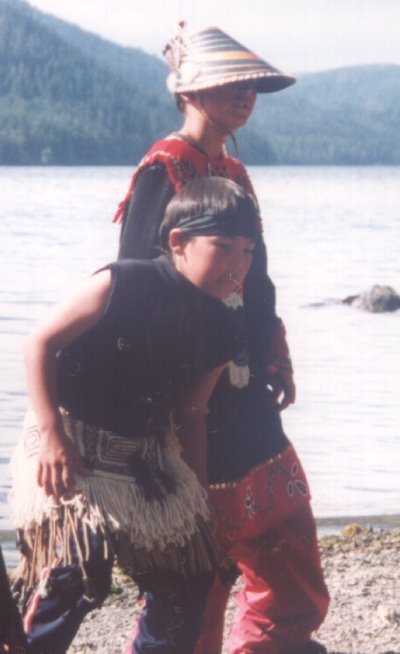Lingít Language and Cultural Revitalization
Yanshuká will help provide traditionally educated Lingít language speakers and teachers a lifelong memory of walking in their ancestorsʼ shoes and living their ancestors' way of life while creating Lingít language resources for future generations. These life lessons and language skills will be documented with video and shared digitally for public use. Each video will be 5-10 minutes long, very specific to subject (e.g. canoeing, fire pit cooking, morning greetings, speaking to bears, etc.)
Living our heritage: Language is the foundation that weaves spirituality, culture and worldview together. Knowledge is embedded in the language. For thousands of years, the Lingít people have learned the sciences through lived experience on this land and have passed that knowledge down to future generations through the language. For example, local brown bears are related to polar bears. The word for bear is xoots, and the word for polar bear is hintak xoodzi, which means the underwater brown bear. A recent DNA study of Alaska bears “discovered” this fact. That is science. Geology is embedded in place names, for example Aliutkina Bay near Sitka has coal deposits, and the Lingit people call that place T’ooch’ Aaní, which mean “land with coal”. When naming fish, the Lingit language often describes habits, habitat or the appearance of a type of a fish. Children grow up not knowing this knowledge, which is key to their identity, history and self-worth. This project will change that.
Living our heritage: Language is the foundation that weaves spirituality, culture and worldview together. Knowledge is embedded in the language. For thousands of years, the Lingít people have learned the sciences through lived experience on this land and have passed that knowledge down to future generations through the language. For example, local brown bears are related to polar bears. The word for bear is xoots, and the word for polar bear is hintak xoodzi, which means the underwater brown bear. A recent DNA study of Alaska bears “discovered” this fact. That is science. Geology is embedded in place names, for example Aliutkina Bay near Sitka has coal deposits, and the Lingit people call that place T’ooch’ Aaní, which mean “land with coal”. When naming fish, the Lingit language often describes habits, habitat or the appearance of a type of a fish. Children grow up not knowing this knowledge, which is key to their identity, history and self-worth. This project will change that.
Applying traditional bodies of wisdom to present concerns:
|
With the Covid lockdowns around the world and in our community, our traditional sense of family and community has been severely eroded. Our culture teaches us to respect each other, hold each other up. When someone succeeds in a Tlingit community, it is because they stand with the support of their parents, clan and ancestors. There were no orphans, because we had clan mothers, fathers and siblings. Today our small families are broken. Grandparents have to compete with entertainment, modern school and long distances for their grandchildren's’ attention. Our sense of community, living together, has been changed by 21st century concepts. We don’t spend time with our grandparents, who are the traditional teachers of the next generation.
Our concept of bridging this communication gap is to record our language in a traditional educational setting and activities, with the help of language students and fluent speakers. We can’t bring most of our fluent Elders to live at the Fish Camp now, but we can bring Fish Camp to them, through video, accessing their memories and sparking the language fluency skills we need. Our language and culture is healing - mentally, physically and spiritually. We are not only teaching our children language, but also going through a healing process after this pandemic. Our Lingit culture teaches us to do what we need to do to survive, like wearing a mask to protect our relatives, friends, and community. This is our way of life, our worldview. |

